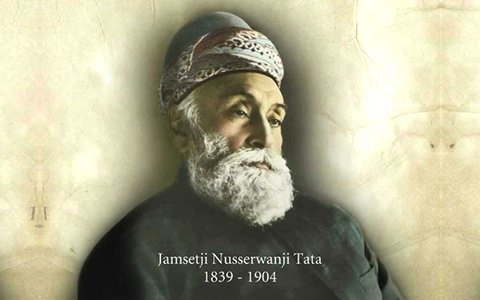Abhyansh Singh Rathore
March 3rd marks a significant date in the annals of history, especially within the realm of industry and enterprise, owing to the visionary contributions of Indian industrialist, Jamshedji Tata. Born on March 3rd, 1839, in a Parsi family in Navsari, Gujarat, Jamshedji Tata’s life journey embodies the spirit of innovation, entrepreneurship, and philanthropy. His remarkable vision and pioneering efforts have left an indelible mark on India’s industrial landscape, shaping the course of its economic development and societal progress. This article delves into the multifaceted legacy of Jamshedji Tata, exploring his entrepreneurial ventures, philanthropic endeavors, and enduring impact on Indian society.
Jamshedji Tata’s journey into the world of business began at a tender age when he moved to Mumbai with his father. Despite hailing from a modest background, young Jamshedji displayed a keen acumen for business and a relentless drive for success. His early exposure to the bustling commercial hub of Mumbai instilled in him a deep appreciation for commerce and industry.
At the age of 14, Jamshedji embarked on his entrepreneurial journey, laying the foundation for a legacy that would transcend generations. His initial foray into business saw him establishing contacts with merchants and traders, laying the groundwork for future endeavors. It was during this formative period that Jamshedji honed his business acumen and cultivated the visionary outlook that would later define his career.
As Jamshedji matured, his entrepreneurial ventures expanded in scope and ambition. Recognizing the burgeoning potential of India’s industrial sector, he set his sights on establishing enterprises that would not only cater to domestic demands but also compete on a global scale. His vision encompassed diverse industries, ranging from steel manufacturing to hydroelectric power generation, hospitality, and education.
One of Jamshedji Tata’s most enduring legacies is the iconic Taj Hotel, a testament to his vision for excellence in hospitality. Conceived as a symbol of luxury and refinement, the Taj Hotel stands as a shining example of architectural grandeur and opulence. Completed in December 1903 at a cost of Rs. 4.21 crores, the Taj Hotel was a marvel of modern engineering, equipped with state-of-the-art amenities and services.
More than just a hotel, the Taj embodied Jamshedji’s vision of creating a haven of hospitality that would rival the finest establishments across the globe. Its impeccable service, exquisite cuisine, and elegant ambiance soon earned it a reputation as the epitome of luxury and sophistication. From hosting dignitaries and celebrities to serving as a venue for grand social events, the Taj Hotel became synonymous with prestige and exclusivity.
Beyond its aesthetic appeal and luxurious offerings, the Taj Hotel also represented Jamshedji’s commitment to social progress and inclusive growth. By employing local craftsmen and artisans, providing vocational training to marginalized communities, and championing sustainable practices, the Taj Hotel set new standards for corporate social responsibility in the hospitality industry.
Jamshedji Tata’s vision extended far beyond the realms of hospitality, encompassing heavy industry and manufacturing. In 1907, his son, Dorabji Tata, founded Tata Steel and Iron Company, marking a watershed moment in India’s industrial history. This pioneering venture laid the foundation for India’s steel revolution and heralded a new era of industrialization and economic growth.
Tata Steel’s inception marked the culmination of Jamshedji’s long-held dream of establishing a world-class steel company that would rival the best in the world. Situated in Jamshedpur, formerly known as Tata Nagar, Tata Steel emerged as a beacon of industrial excellence, combining cutting-edge technology with a commitment to quality and innovation.
Under Dorabji Tata’s leadership, Tata Steel revolutionized the steel industry by introducing modern manufacturing practices, implementing stringent quality control measures, and fostering a culture of innovation and excellence. From producing high-quality steel for railway tracks and infrastructure projects to supplying armored plates for military applications, Tata Steel played a pivotal role in India’s industrial transformation.
Jamshedji Tata’s philanthropic endeavors were as remarkable as his business acumen, reflecting his deep-seated commitment to social welfare and community development. Recognizing the importance of education in nation-building, he envisioned the establishment of world-class educational institutions that would nurture future leaders and innovators.
The Indian Institute of Science (IISc) in Bangalore stands as a testament to Jamshedji’s philanthropic vision and commitment to educational excellence. Founded in 1909, IISc remains one of India’s premier research institutions, fostering cutting-edge research and innovation across diverse fields of science and technology.
In addition to his contributions to education, Jamshedji Tata also prioritized healthcare, housing, and social welfare initiatives for the underprivileged. From funding hospitals and dispensaries to providing affordable housing and sanitation facilities, his philanthropic initiatives touched the lives of millions, leaving a lasting legacy of compassion and care.
The legacy of Jamshedji Tata continues to inspire and resonate with generations of Indians, embodying the ideals of entrepreneurship, innovation, and social responsibility. His visionary leadership, pioneering ventures, and philanthropic endeavors have left an indelible mark on India’s industrial landscape, shaping the nation’s economic trajectory and societal progress.
As we commemorate the life and legacy of Jamshedji Tata on March 3rd each year, let us reaffirm our commitment to upholding his ideals and values. By embracing innovation, fostering inclusive growth, and championing social responsibility, we can honor Jamshedji Tata’s legacy and build a brighter future for generations to come.


